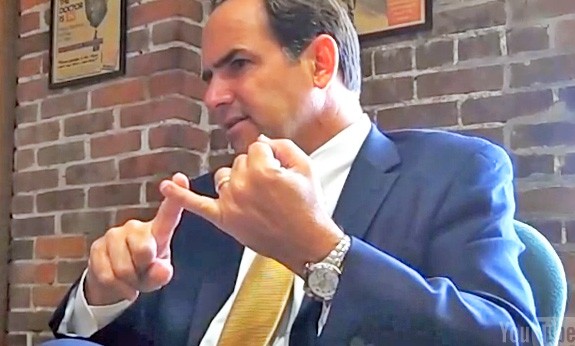Tennessee Republicans who, eight years ago, were faced with choosing between candidates for governor, may remember one Zach Wamp, then a U.S. Congressman from Chattanooga, who ran in a stoutly contested Republican gubernatorial primary against Lieutenant Governor Ron Ramsey and Knoxville Mayor Bill Haslam, the ultimate winner of both the GOP primary and the general election.
On Tuesday, with state voters already seriously mulling over the would-be candidates to succeed the term-limited Haslam, Wamp was once again before a local audience, as he had been scores of times in 2010. Only this time, as he addressed members of the Rotary Club of Memphis at Clayborn Temple, Wamp was conspicuously no longer a party man. As he told the Rotarians, “In 2017, I dislike the Republican Party almost as much as I dislike the Democratic Party.”
 Jackson Baker
Jackson Baker
Zach Wamp
Wamp’s appearance was under the auspices of Issue One, a national nonprofit group of which he is co-chair and which espouses a return to nonpartisan voting, the singular issue which Wamp and his cohorts in the movement believe is what the nation’s founders had in mind.
As Wamp remembers it, the years of the 1990s, during which Democratic President Bill Clinton and Republican House of Representatives Speakers horse-traded back and forth on measures such as one calling for a balanced-budget, constituted the last hurrah of the two-party system. After that, things became more tribal in Washington, with members hunkering down within their respective parties and spending half their time raising money. They ceased even getting to know members of the opposing party; still less were they inclined to make common cause with them, as Wamp remembers doing in working out TVA matters along with then-Vice President Al Gore.
The result, Wamp said, has been an increasing tendency to put party ahead of country, a sea change that has left the country’s voters dissatisfied and unrepresented and that accounted for the success of the outlier candidacies of Bernie Sanders and Donald Trump in 2016.
Hence the call of Wamp’s group — and like-minded groups such as No Labels — for a new nonpartisan politics and non-affiliated candidates, the core of whom would come, not from aging baby boomers like himself, but from millenials, some 71 percent of whom are professed independents. To boost that possibility, Issue One has scheduled a two-day event, entitled “Restoring the Founders’ America,” for next spring in Philadelphia.
Wamp may be correct about the fact of ongoing alienation from politics-as-usual, especially among the young, and his organization may also be onto something with its call for independent citizen-candidacies. But, as he acknowledged, the current system — especially in the wake of the “Citizens United” Supreme Court ruling — is held fast to its moorings by lavishly committed special-interest money, and the only real way to change that is by changing the Court, which requires in its turn the kind of altered voting pattern Wamp advocates.
It’s a chicken-egg question, but Wamp and those like him who would be mentors to a new electorate still believe they can redeem the process. Right on, we say.